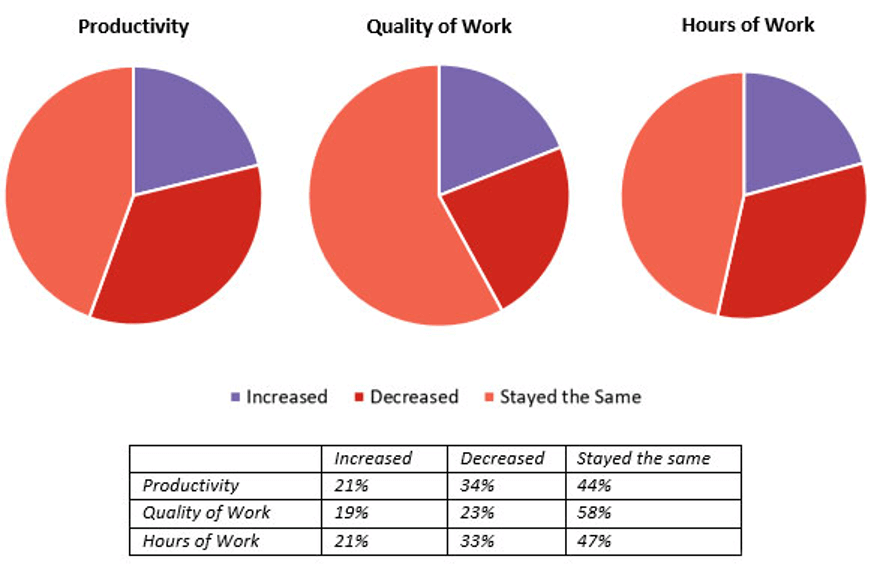ADP Canada’s Workplace Insights series continues to explore the impact of COVID-19 on Canadian workplaces and the Canadian economy’s reshaped workforce. While previous surveys explored employee health and safety and employer readiness and response, the third, and most recent survey, focused on the implications of COVID-19 on Canadians working remotely.
The survey, conducted by Angus Reid on behalf of ADP Canada, showed that most remote workers (74%) say their manager has clearly communicated expectations around remote work. Although respondents say many employers have been clear on expectations, they are split on how they feel about the “new normal” and highlighted some of the key challenges regarding remote work.
The most common challenge reported by remote workers across Canada was not feeling connected to their colleagues, with more than half (57%) expressing this sentiment. Another challenge identified was difficulty staying focused because of too many distractions. This sentiment was particularly common among younger employees, with 51 per cent of workers aged 18 to 34 saying they find it difficult to focus while working from home.
Emotions were mixed regarding another challenge related to remote work: stress. While 38 per cent of workers said their stress levels remained the same, 34 per cent said their stress had increased and 28 per cent said it had decreased. Women were more likely to feel this way, with 38 per cent of women reporting an increase in stress levels, compared to only 29 per cent for their male counterparts. Results also differed across the country. Workers in Saskatchewan and Manitoba reported the highest increase of stress due to working remotely – a full 20 per cent more than the national average (54% vs 34%).
Other Key Findings on the Challenges of Remote Work Were:
- Roughly one-quarter of remote workers reported having difficulty taking breaks because they were too busy (27%) and reported struggling with managing their mental health (24%);
- One in five (22%) have trouble managing their physical health and wellness. This sentiment was especially common in Atlantic Canada, where 34 per cent of participants said this was a key challenge.
- For those with children at home, 16 per cent said it was difficult balancing childcare and their work; and
- Nearly one in five (18%) reported facing no challenges working remotely.
While the new economic and public health landscape is likely to affect at least one aspect of most workplaces, those challenges can be amplified when an entire workforce must transition to remote operations. ADP Canada’s survey also explored how Canadians feel remote work has influenced key indicators, including productivity, quality of work, and hours of work.

The findings showed that roughly one half of remote workers feel their productivity, quality, and hours of work have stayed the same since the transition to working remotely. Furthermore, approximately one-in-five thought their productivity, quality of work and work hours had increased while one quarter to a third thought these three measures had decreased. This trend was shown across all ages and genders.
Interestingly, Canadians working from home were evenly split when it comes to the future of remote work, with 44 per cent reporting they would prefer to work remotely long term and 45 per cent saying they look forward to returning to the office.
“The rapid shift to remote work has caused some challenges for Canadian employees, namely, staying connected with their fellow colleagues and teams,” says Heather Haslam, Vice President of Marketing, ADP Canada. “Though most managers have communicated clear expectations around remote work, it’s important for teams to feel connected and supported. Management can look to adopt collaboration tools and technology to further support team communication and workflow. In addition, hosting virtual team social meetings or setting up more frequent touchpoints with team members can help everyone stay connected.”
About ADP Canada’s Workplace Insight series on COVID-19
Coronavirus, or COVID-19, is a global pandemic affecting many aspects of life, including employment and the Canadian and global economies.
ADP Canada has leveraged the Angus Reid Forum to conduct bi-weekly surveys in order to deliver timely, relevant insights on how workplaces have been impacted by the pandemic, as well as their level of preparedness and how they’ve responded to this international pandemic.
These are the findings of a survey conducted by ADP Canada from April 20 to April 21, 2020, with a representative sample of 500 remote-working Canadians who are members of the Angus Reid Forum. They survey Businesses in English and French.
About Angus Reid Forum Surveys:
The precision of Angus Reid Forum online polls is measured using a credibility interval. In this case, the poll is accurate to within +/- 4.4 percentage points, 19 times out of 20, had all Canadians been polled. All sample surveys and polls may be subject to other sources of error, including, but not limited to coverage error, and measurement error.
Learn more
Register to view the session recordings from the ADP Virtual Summit, Webcast: Learning in a virtual world. With a remote workforce commonplace, the way we work, communicate, collaborate, and learn has changed. Use this tip sheet to guide your leaders and managers with the right strategies and tools to connect teams remotely and continue their professional development.
Launch this podcast anytime: Complying with the New Normal: Exploring the HR challenges and their solutions in today’s new world of remote work. In this episode, we talk through what ADP Canada’s Workplace Insights study series uncovered – in regards to employee health and safety, employer readiness and response, and the pandemic’s impact on remote workers.



